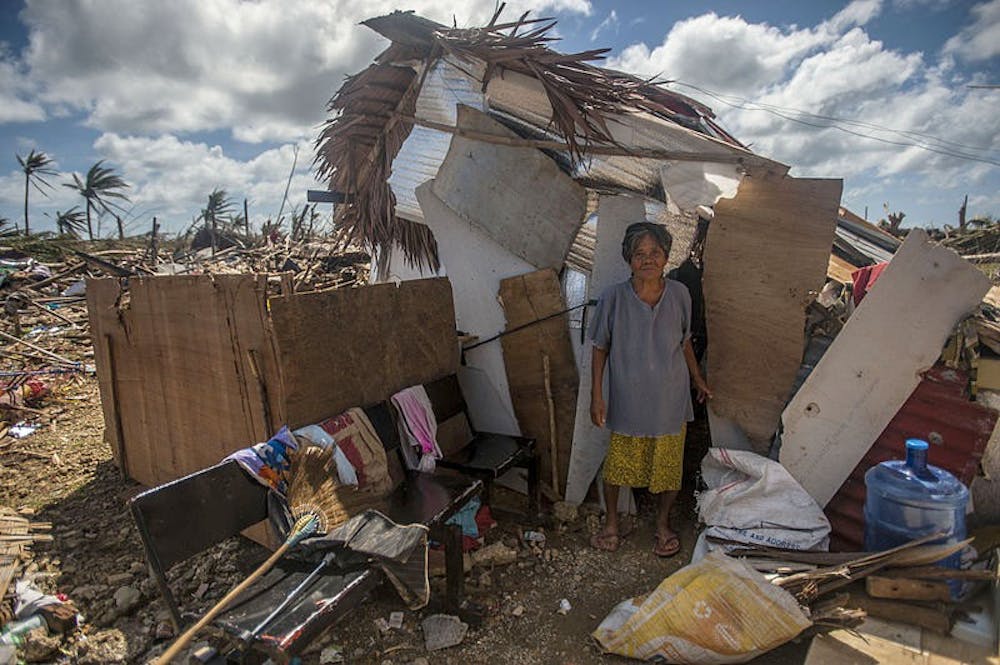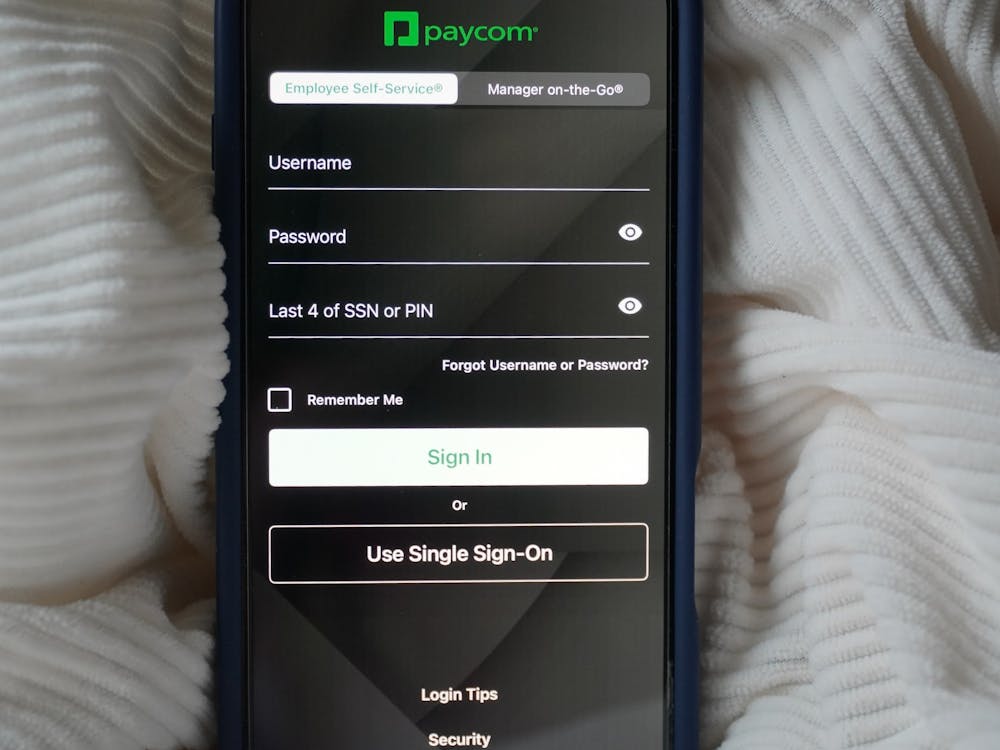Olivia Alsept-Ellis |
Students learn about the reality of life as an undocumented immigrant on the Border Immersion trip
The warmth of Tucson, Ariz. welcomed a Moreau Center immersion this spring break, but the students saw for themselves the tense political environment for undocumented immigrants living so close to the wall – the structure that marks the border between the United States and Mexico.
Two students, seniors Jeffrey Kuang and Elizabeth Polsin, felt the Border Service and Learning Immersion gave them far more than an academic education about political tensions. The multifaceted approach to the trip allowed them to learn about American immigration from a wide variety of sources such as nonprofits, federal judges, governmental facilities and locals – like as a rancher who lived only 20 miles from the border. They even walked into the desert to pay homage at the memorials for those who died while trying to cross onto American soil.
The immersion trip left the group troubled over the American treatment of immigrants, yet inspired and motivated to create awareness.
“I will always picture the wall, just there. With myself on one side and a whole other community on the other. And just that image makes me really angry,” Polsin said. “It’s really important to expose people to the injustices.”
Pat Ell, assistant director for leadership development in the Moreau Center, said the trip offers a tangible understanding of these issues.
“It becomes more real. You’re actually, physically in a place. You talk to real people,” Ell said. “You get a thorn stuck in your foot, or something, and feel how hot it is. And we were only walking for an hour, instead of three days.”
Kuang said he learned how the legal system in Arizona was designed to act against the undocumented immigrant living in the U.S. They listened to a judge, who quoted American jurist Oliver Wendell Holmes Jr.: “This is not a court of justice, young man, this is a court of law.”
“But if that judge separates law and justice, he insinuates that law is not capable of being just for everyone,” Kuang said.
The attitude of this judge embodied, for Kuang, the larger attitude of the American legislation towards immigration.
“How can we strive for ‘liberty and justice for all’ when this system is not exactly ‘for all?’ And it’s really dehumanizing,” Kuang said.
Senior Elizabeth Polsin, a trip coordinator alongside junior Yuri Hernandez, attended the previous border immersion program to San Diego. She said the two trips covered similar material but the experiences were not easily comparable.
“The culture in San Diego is a lot more accepting of Mexican culture, whereas Arizona, the racism is much more prevalent,” Polsin said.
Polsin explained the details of a bill, SB 1070, that was recently passed in Arizona. It allows for the law enforcement officers to ask to see proof of legal documentation or immigration status, regardless if this person has actually committed any offense.
“(The law enforcement) can just pick someone out because they look Mexican,” Polsin said. “But it just doesn’t seem right to go up to someone and be like, ‘Do you belong here or not?’ Because everyone belongs anywhere, I think.”
Alongside the judge, the group saw other official immigration facilities, such as the U.S. Immigrations and Customs Enforcement (ICE) detention facility. Kuang described this center as a judicial limbo.
“The (ICE tour guide) said ‘Look how happy they are!’ he said with his big, chipper smile,” Kuang said, sarcastically laughing. “He kept saying that as there were hundreds of people in line, hundreds of detained people.”
Another speaker the group met with was a 19-year-old student whose mother was currently detained in an ICE facility. He is legally undocumented as well as his mother, although Polsin made sure to use the word “undocumented” with air quotations to emphasize her disdain for the word. His mother was detained and is awaiting a court hearing to determine if she will be deported.
“He just started bawling and so I started bawling. Everyone did. Just thinking, anyone’s family could be just torn apart like that,” Polsin said.
Emotional instances like these, however, contributed to the group’s cohesion. Polsin said it took very little time before they trip attendees turned into “family,” from the students to the tour guides to the professors who accompanied, Alejandro Santana and Rene Sanchez.
The group, a collection of once-strangers, is a now tight-knit team who can reflect on these experiences together and spread their wealth of knowledge with the campus.
“In our UP community, it’s a great community, but we can be shut off from what’s going on in the world,” Polsin said.
Kuang said he felt the most important thing he took away from the trip is the importance of empathetic listening.
“It’s like the quote, ‘I don’t always have the answers to the issues’,” Kuang said. “‘But we should always listen to the stories.’”
Nastacia Voisin |
Students embarked on a self-created service trip to help build homes and foster relationships in Haiti
On the seven-hour truck ride down from the Haitian mountain village of Thiotte, Amanda Ewing and Tara Benavente were already plotting a return journey.
The senior social workers had spent their fall break under the unforgiving Caribbean sun replacing tin roofs, building relationships with villagers and testing the limits of strength. Both women returned to UP convinced they needed to share their stories and inspire others to follow them back to Haiti.
“I developed such a passion for these people and this country, and I know how God’s presence can completely transform people’s lives there,” Ewing said. “I wanted people to be part of that experience.”
Over spring break Ewing and Benavente led 23 UP students and two hall directors on a service trip to Haiti – the result of over a year of planning, fundraising and teamwork.
In Haiti the group divided their time between working to expand a church and helping with a Bible school program. Each day half the team would labor at the church worksite in Mariani while the other half visited schools – some with up to 600 children – telling Bible stories, teaching songs and building friendships.
“There was a lot of self-sacrifice and hard work,” Benavente said. “The days were long and hard and people were definitely tired. But when we did our debriefing, the consensus was that it was a life changing experience for everyone.”
Days spent mixing cement, digging the foundations of a church and interacting with people amid the extreme poverty of tent villages was challenging for some students, a few who had never left the States before. The team learned to communicate with a mixture of English, Spanish, Haitian Creole, gestures and smiles. They adapted to the Haitian way of keeping a flexible schedule, and stepped outside their comfort zones to connect with the people they worked alongside.
At the start of the week, junior education major Clara LeeWays was troubled that the team was building churches and holding Bible study sessions instead of devoting all their time to practical efforts, such as building homes.
“Short-term mission trips are really hard to get your head around,” LeeWays said. “You’re spending all of this money but are you really impacting people’s lives?”
Yet LeeWays said that a moving conversation with a pastor and witnessing the impact of her service reassured her of the mission’s value.
“What I really took away from (the trip) was the importance of the one-on-one relationships we made,” LeeWays said. “A bunch of us are already talking about getting a group together to go over winter break.”
With a number of students excited about a return trip to Haiti, Ewing and Benavente hope their initiative will take root at UP even though their trip was planned through Forward Edge International, a Christian program that organizes international relief work.
Initially in 2013 they had hoped to launch the trip with the help of the Moreau Center. But UP doesn’t usually connect with programs that aren’t explicitly Catholic, and Ewing was told that a partnership might take years to form.
But she was undefeated.
“I saw such high value in this trip that I was going to plan it anyway,” she said.
From casual conversations, emails to friends and the support of Forward Edge International, Ewing and Benavente gathered a team of 27 people by October 2013. Most were UP students, but they were joined by Corrado and Mehling’s hall directors Mike Wode and Gina Loschiavo, as well as two non-UP volunteers. By the next month they’d begun fundraising to cover the $595 per-person trip fee and the round trip flights of about $1,000.
“There were some people who couldn’t afford it,” Ewing said. “And honestly it depends on where people are at too. I told people not to have financial concerns because I trusted God. But some people didn’t feel called to put their faith out there.”
Ewing and Benavente set up fundraising projects such as a concert at Cathedral Coffee called “Hearts for Haiti,” a dinner fundraiser at Amalfi’s restaurant, Valentine’s Day candy grams, and a recycling project of cans and bottles.
The trip cost helped pay for the volunteers’ stay, as well as building supplies and food for the people they’d be serving. But like LeeWays, Ewing said she realizes these missions trips may be more meaningful to the volunteers than the communities they’re serving.
Yet Ewing said her calling was to bring people to Haiti to help them develop a heart for serving.
“My goal wasn’t so much to bring a huge team to serve, but to have people understand what it looks like to go and have your life changed,” Ewing said. “You might not see the work we did this week, but I believe we made a difference.”








